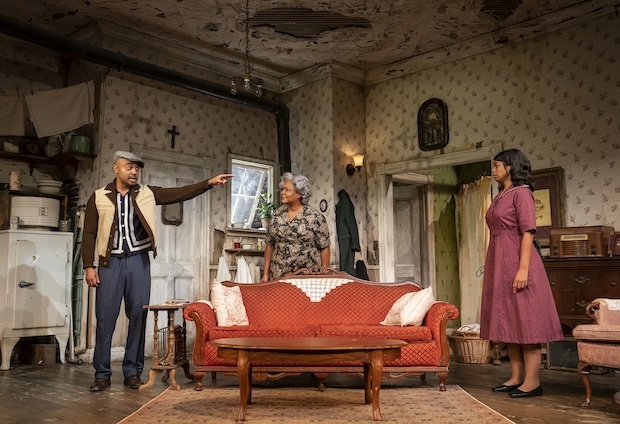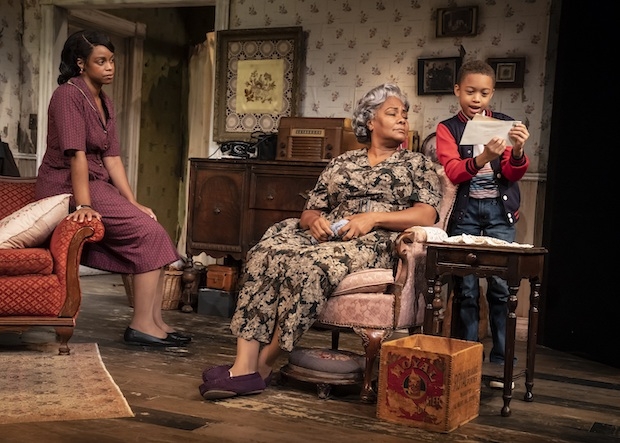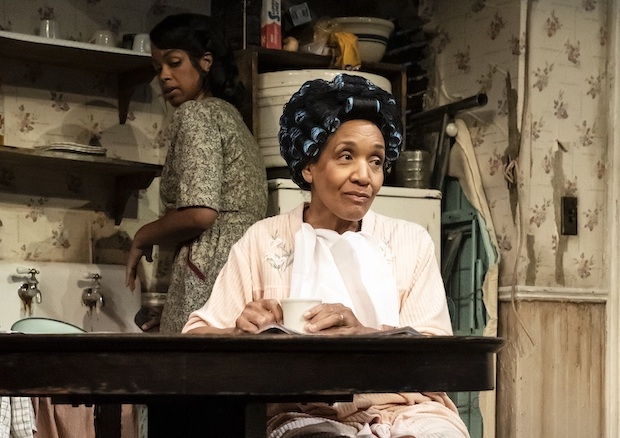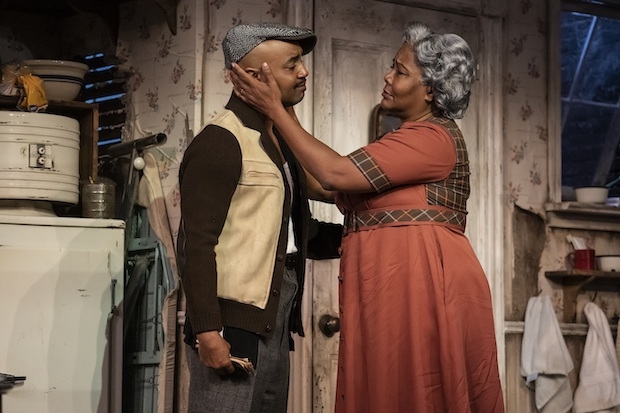Review: A Raisin in the Sun and the Ghost of a Happy Ending

(© Joan Marcus)
The Younger family apartment on Chicago's South Side has seen better days: Paint barely clings to the crown molding, with water damage curling the wallpaper. A large hole has opened on the wall separating the living room from the bedroom, and an even larger one is visible in the ceiling. Anyone would want to leave this "rat trap," as two of the residents call the setting of Lorraine Hansberry's A Raisin in the Sun, which is now receiving a rare off-Broadway revival at the Public Theater under the direction of Robert O'Hara.
First presented on Broadway in 1959, Hansberry's play is a masterpiece of American drama, offering an intimate view of racial, sexual, and class dynamics in our country through the story of one Black family on the brink of taking a major step on the path of the American Dream: They're buying a house. Hansberry's keen insights still astound, despite the efforts of the director to interrogate the play through select moments of provocation.
Clint Ramos's detailed and arresting set is the least pretentious (and most effective) of O'Hara's contributions to Raisin, which were first seen when he directed the play for Williamstown Theatre Festival in 2019. It makes us instantly understand why Lena Younger (Tonya Pinkins) would want to use the $10,000 life insurance payment she has received following the death of her husband to move her family to their own home. Her grandson, Travis (Toussaint Battiste), is playing with rats in the street. Travis's mom, Ruth (Mandi Masden), is pregnant and considering an abortion. Lena's daughter, Beneatha (Paige Gilbert), wants to attend medical school, and the new ideas she's picked up at college lead her to increasingly clash with her family. There just isn't enough room in the apartment to contain the Youngers' vitality.
But Lena's son, Walter Lee (Francois Battiste), has his own idea of what to do with the money: He wants to buy a share in a liquor store so that they can earn even more than $10,000. When Lena goes ahead and puts a down payment on a house (in the all-white Clybourne Park neighborhood) Walter Lee accuses her of "butchering" his dream.

(© Joan Marcus)
In an interview with TheaterMania, O'Hara laments the emphasis placed on Walter Lee, saying, "You have these three dynamic Black women in this show, and people want to make it about a man and his dreams." It is curious, then, that O'Hara has added another man to his staging: Calvin Dutton plays the ghost of Walter's father, who moves about the apartment haunting the decisions of the living. He's like the elder Hamlet, but instead of ordering his surviving family to kill, he wants them to have babies and move to the suburbs. Adding a ghost to the staging of a classic is a choice that has been tried before, most notably in the 2013 Broadway revival of Cat on a Hot Tin Roof (that show's director ultimately made the wise decision to cut it).
While the memory of Big Walter and his thwarted ambition certainly influences Lena, is it the primary reason she buys the house? What about the needs of her grandchildren, including the one Ruth might not have? And what about Lena's desire to live out her remaining years digging in her own little garden? (She inexplicably leaves her beloved houseplant in the care of her dead husband in the final scene of this production.) By making Big Walter such a big presence, O'Hara pulls focus from the women and places it on a man not even in the dramatis personae.

(© Joan Marcus)
Then there's the moment deep in the third act in which O'Hara places a literal spotlight on Water Lee to deliver a monologue directly to the audience about the performative subservience the white public expects from Black people. "Gonna put on a show for the man," he says, holding up a copy of the show program before hurling it into the audience like the world's saddest punk rocker.
Thankfully, several of the performances rescue Raisin from the excesses of its director: Masden embodies a woman who thinks she's reached a dead end, suddenly sees a light at the end of the tunnel, and races toward it for dear life. Watching her performance is more thrilling than any action movie. Perri Gafney makes a memorable appearance as the undermining neighbor Mrs. Johnson, who shows up at the Younger apartment to eat their pie and offer backhanded well-wishes (her volleys with Pinkins are championship-level passive-aggression). Mister Fitzgerald oozes with condescension as George Murchison, the scion of a wealthy Black family. And John Clay III is alluringly guarded as Asagai, Beneatha's classmate and love interest, who dazzles her with visions of his native Nigeria.

(© Joan Marcus)
As the family matriarch, Pinkins gives a performance that is equal parts sweet tea and arsenic. She is charming in front of strangers like Asagai, but terrifying behind closed doors, enforcing the rules of her house with real violence (she reminded me of my own maternal grandmother). When Beneatha calls her a "tyrant," we know this isn't undergraduate hyperbole. But when Lena sees her family ripping apart at the seams, what choice does she have but to hold them together in her iron embrace? In her multilayered performance, Pinkins comes the closest to approaching the complexity of Hansberry's script.
A spectacular scenic transition dominates the final moment. It is O'Hara's way of foreclosing on the possibility that audiences will walk away from Raisin thinking it has a happy ending, something that frustrated Hansberry about the original run. "If he thinks that's a happy ending, I invite him to come live in one of the communities where the Youngers are going," Hansberry responded to one such viewer during an interview with Studs Terkel. It's definitely not a happy ending, but one wonders if an audience steeped in discourse about systemic racism (as the off-Broadway audience of 2022 is) might come to that conclusion without the expensive and blunt sledgehammer employed here. It's not going to be Leave It to Beaver for the Youngers, but it's hard to see the attainment of a cornerstone of generation wealth as a tragedy. In his push for a less optimistic ending, O'Hara flattens a text that is full of peaks and valleys.











